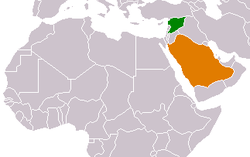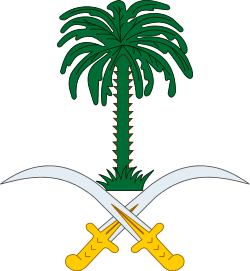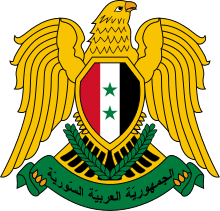Saudi Arabia–Syria relations
 |
|
Syria |
Saudi Arabia |
|---|---|
Saudi Arabia–Syria relations refer to diplomatic and economic relations between Saudi Arabia and Syria. Diplomatic ties between these two countries of the Middle East have long been strained by the major events in the region. Relations between Saudi Arabia and Syria deteriorated further following the Syrian Civil War and Saudi Arabia's numerous calls for Bashar al-Assad to be removed from power. Saudi Arabia cut off relations with Syria after they decided to close its embassy in Damascus and expel the Syrian ambassador in 2012.
Factors affecting relations
Sonoko Sunayama, a Middle East expert, argues that although economic concerns and balance of power are important, concerns about identity and ideology play the most significant role in the two countries' relations.[1] Ian Black of the Guardian, on the other hand, states that Saudi foreign policy in general mostly focuses on business involving financial incentives and low-profile initiatives, which continued towards Syria until King Abdullah's high-profile condemnation of the Assad government in 2011.[2]
Both countries share Arab nationalist and Islamic identities.[1] However, a significant element of their identity and government, namely secular versus conservative pattern, is completely different in that Syria has a secular government and life-style, while Saudi Arabia a conservative regime and world view.[2]
History
The relations between two countries have been turbulent since their establishment as modern states.[3]
1940s through 1960s
A Syrian mission was opened in Saudi Arabia in 1941.[4] King Abdulaziz reportedly advocated the independence of Syria and Lebanon from both the Hashemite dynasty and the French mandate.[4] The King met Shukri Al Quwatli, the first president of independent Syria, on 17 February 1945 in Al Fayyum, Egypt.[4] Both countries were the founding members of the Arab League which was established in 1945.[5]
Saudi Arabia supported the coup in Syria by Adib Shishakli in December 1950.[4] Nevertheless, Saudi Arabia and Syria were in rival camps in the 1950s and 1960s as a result of the policies of Egypt's leader Gamal Nasser and of the Cold War. Syria advocated Nasser's policies and was the major Arab ally of the USSR.[6] However, Saudi Arabia was among the opponents of Nasser's policies and was close to the United States. Following the Baath party's rule in Syria in 1963, their diplomatic ties again became tense.[3] A left-wing faction of the Baath Party, called the Neo-Baath, led by Salah Jadid took over the government on 23 February 1966, further damaging the relations.[7] Because new Syrian government declared war against monarchist nations, including Saudi Arabia.[7]
1970s and 1980s
At the end of November 1970, the neo-Baath leaders were toppled and removed, and Hafez Assad became the ruler of Syria.[7] Diplomatic negotiations between two countries were opened and renewed.[7] With the death of Nasser in 1972 the relations began to further improve.[3]
Three months before the joint attacks of Egyptian and Syrian forces on Israeli forces in the Sinai and the Golan Heights Egyptian President Anwar Sadat and Syrian President Hafez Assad visited King Faisal in Riyadh in August 1973.[8][9] In turn, King Faisal visited Damascus in 1974[10] and persuaded then US Secretary of State Henry Kissinger to include Syria as a key participant in any Arab-Israeli negotiations.[11] King Khalid, successor of King Faisal, stated in 1975 that Saudi Arabia supported the Syrian role in the Lebanese civil war.[12] Hafez Assad participated in the Riyadh summit held in 1976.[13]
Syria's alliance with the Islamic Republic of Iran during the Iran–Iraq War again led to strained relations at the beginning of the 1980s.[3] Syrian president Hafez Assad paid a significant visit to Riyadh on 22 December 1981.[11] When King Fahd became the ruler of Saudi Arabia in 1982 he developed a special bond with Assad and it continued throughout his reign.[14] In October 1989, both countries actively advocated the Taif agreement that reestablished the Lebanon's political system and ended civil war in Lebanon.[15]
1990s
The relations between Saudi Arabia and Syria were positive in the 1990s.[16] Following the invasion of Kuwait by then Iraqi president Saddam Hussein in August 1990, Syria took part in the US-led international coalition that was established to defend Saudi Arabia and liberate Kuwait.[17]
2000s
Four months after Bashar Assad succeeded his father as Syrian president, he visited Saudi Arabia in October 2000 and met King Fahd.[18] It was his second state visit after Egypt.[18]
The assassination of the Lebanese Prime Minister Rafik Hariri, an ally of Saudi Arabia, in Beirut on 14 February 2005 was detrimental to the relations.[16][19] The Israel-Lebanon war in 2006 further damaged the relations since Syria overtly advocated Hezbollah.[20] Relations between Saudi Arabia and Syria began to become strained in August 2008 when Saudi Arabian ambassador was called back to Riyadh and then, withdrawn in protest over Syrian forces' crackdown on anti-government demonstrators.[21][22] In addition, King Abdullah boycotted the Arab League's summit held in Damascus in 2008.[23]
However, Saudi Arabia appointed its ambassador to Damascus, Abdullah Al Eifan, on 25 August 2009.[19][24] Bashar Assad visited Riyadh in September 2009.[24][25] In October, King Abdullah visited Syrian President Bashar Assad in Damascus that was regarded as a rapprochement between two countries.[23] In addition, Syria appointed a new ambassador, Mehdi Dakhlallah, to Saudi Arabia the same month.[26] Therefore, diplomatic ties were reestablished.[21] By January 2010, Syrian President Assad visited Saudi Arabia for three times.[27]
Syrian civil war
Syrian civil war that began in 2011 damaged the relations between two countries.[16] Because Saudi Arabia have been allegedly sending weapons to the opposition forces, while Iran to the Assad forces.[28] It was Saudi King Abdullah who was the first Arab leader to condemn the Assad government in August 2011 "due to its method to deal with the anti-government" demonstrations."[29][30]
As a result of these events, Saudi Arabia withdrew its delegation from the Arab League's peacekeeping mission in Syria on 22 January 2012[31] and closed its embassy in Damascus in February as well as expelled Syrian ambassador.[32][33]
Economic ties
One of the early economic relations between Saudi Arabia and Syria was in 1950 when a trade agreement was signed and Saudi Arabia provided Syria with financial support.[4] It followed other trade agreements, but all of them were cancelled by King Faisal on 3 May 1966 due to hostile attitude of the neo-Baath government in Syria towards Saudi Arabia.[7] On 4 April 1972, the two countries signed another trade and economic agreement.[34][35] It allowed free imports and exports of local products between two countries without customs fees for agricultural products, livestock and natural resources.[34] Following the Syrian support for the coalition in the war against the invasion of Kuwait, Syria was provided with nearly $2.2-2.6 billion in aid by Kuwait and Saudi Arabia.[36] In February 1991, a joint committee was formed by Saudi Arabia and Syria, and it fostered economic cooperation between the countries.[37]
In 1997, Syrian exports to Saudi Arabia included mostly livestock, fruits, vegetables, textiles and furniture of which overall cost was over 602 million Riyals.[38] Major items exported by Saudi Arabia to Syria were crude oil and its by products, plant oil and dates, and the 1997 cost of them was nearly 262 million Riyals.[38] In addition, Saudi Arabia had private investments in Syria with a cost of US $700 million in the same year.[38] The number of joint projects was around 50.[38]
Syria and Saudi Arabia signed an accord on 20 February 2001 to set up a free trade area.[39][40] In December 2001, the two countries and Jordan signed a memorandum of understanding concerning the construction of a railway link to be used by all three for commercial purposes.[40] Later both countries joined the Greater Arab Free Trade Area (GAFTA).[21]
In parallel to tense diplomatic relations in 2008, both countries began to put taxes on each other's products, but, taxes were ended in 2009.[21] Unofficial figure for the 2007 annual Saudi investment in Syria was $750m and it increased to $1 billion in 2009.[21] On 6 and 7 March 2010 Saudi-Syrian Business Forum and the 11th Session of the Syrian-Saudi Joint Committee were held in Damascus.[41] Five cooperation agreements were signed during the events.[41]
See also
References
- 1 2 Kalmbach, Hilary (2009). "Book Review" (PDF). International Journal of Middle East Studies. 41. Retrieved 12 August 2013.
- 1 2 Black, Ian (8 August 2011). "Saudi Arabia's rare criticism of Syria reveals their underlying antipathy". The Guardian. Retrieved 12 August 2013.
- 1 2 3 4 Al Saadi, Yazan (4 February 2012). "Saudi-Syrian Relations: A Historic Divide". Al Akhbar. Retrieved 11 August 2013.
- 1 2 3 4 5 Mohammad Zaid Al Kahtani (December 2004). "The Foreign Policy of King Abdulaziz" (PDF). University of Leeds. Retrieved 21 July 2013.
- ↑ "Arab League". The Columbia Encyclopedia. 2013. Retrieved 17 December 2013. – via Questia (subscription required)
- ↑ Patrick Seale (1997). "3 Syria". In Yezid Sayigh; Avi Shlaim. The Cold War and the Middle East. Oxford: Clarendon Press. Retrieved 11 September 2013. – via Questia (subscription required)
- 1 2 3 4 5 Joseph Mann (2006). "The Syrian Neo-Baath regime and the Kingdom of Saudi Arabia, 1966–70". Middle Eastern Studies. 42 (5): 761–776. doi:10.1080/00263200600828014. Retrieved 21 August 2013.
- ↑ "The October War and U.S. Policy". The National Security Archive. 7 October 2003. Retrieved 11 August 2013.
- ↑ Joseph A. Kechichian (9 April 2010). "King Faisal's lieutenant on world stage". Gulf News. Retrieved 11 August 2013.
- ↑ "Seminar focuses on King Faisal's efforts to promote world peace". Arab News. 30 May 2002. Retrieved 11 August 2013.
- 1 2 Geoffrey Godsell (23 December 1981). "Syrians and Saudis work to reverse setbacks to the Arab cause". The Christian Science Monitor. Retrieved 11 August 2013.
- ↑ Andrew Downer Crain (1 January 2009). The Ford Presidency: A History. McFarland. p. 142. ISBN 978-0-7864-5299-6. Retrieved 12 August 2013.
- ↑ "Saudi Arabia and Syrian Revolution". Arab News. Jeddah. 15 January 2012. Retrieved 3 January 2014. – via HighBeam (subscription required)
- ↑ "No news -- good news?". Al Ahram Weekly (745). 2–8 June 2005. Retrieved 26 August 2013.
- ↑ A. Ehteshami (2002). "The foreign policy of Iran". In Lynne Rienner. The foreign policies of Middle East states (PDF). Boulder, Co. pp. 283–290.
- 1 2 3 Benedetta Berti; Yoel Guzansky (October 2012). "The Syrian Crisis and the Saudi-Iranian Rivalry". Foreign Policy Research Institute. Retrieved 11 August 2013.
- ↑ "Brief History of Syria". Syrian Friendship Association. Retrieved 11 August 2013.
- 1 2 "On President Assad's visit to Saudi Arabia". Arabic News. 9 October 2000. Retrieved 11 August 2013.
- 1 2 Alex Sorin (7 July 2009). "Saudi Arabia appoints ambassador to Syria". The Jerusalem Post. AP. Retrieved 3 January 2014.
- ↑ Phil Sands (10 July 2009). "New chapter for Syria-Saudi relations". The National. Retrieved 11 August 2013.
- 1 2 3 4 5 Sands, Phil (3 November 2009). "Syria and Saudi end tariff war". The National. Retrieved 13 August 2013.
- ↑ "Saudi Arabia recalls ambassador to Syria". BBC. 8 August 2011. Retrieved 11 August 2013.
- 1 2 Andrew Lee Butters (8 October 2009). "A Rapprochement Between Syria and Saudi Arabia?". Time. Retrieved 11 August 2013.
- 1 2 "Asad's visit: Saudi-Syrian rapprochement back on track?". Wikileaks. 1 October 2009. Retrieved 6 December 2013.
- ↑ "Syrian president appoints ambassador to Saudi Arabia". BBC Monitoring International Reports. Al Quds Al Arabi. 30 September 2009. Retrieved 13 August 2013.
- ↑ "Dr.Mahdi Dakhlallah is Syria's ambassador to Saudi". SNS. 1 October 2009. Retrieved 13 August 2013.
- ↑ Oudat, Bassel (21–27 January 2010). "Testing the waters". Al Ahram Weekly (982). Retrieved 13 August 2013.
- ↑ Michael Bröning (17 December 2012). "Time to Back the Syrian National Coalition". Foreign Affairs. Retrieved 11 August 2013.
- ↑ Jacobs, Joshua (12 April 2012). "The danger that Saudi Arabia will turn Syria into an Islamist hotbed". The Christian Science Monitor. Washington. Retrieved 12 August 2013.
- ↑ Bilal Y. Saab (31 August 2011). "How Saudi Arabia can contain Iran – and other benefits from Syria's turmoil". The Christian Science Monitor. Washington. Retrieved 30 August 2013.
- ↑ "Chronology: Saudi Arabia". The Middle East Journal. 66 (3). Summer 2012. Retrieved 3 September 2013. – via Questia (subscription required)
- ↑ Yoe Goldmanl (15 March 2013). "Saudi Arabia, Italy and Holland close embassies in Syria". The Times of Israel. Retrieved 11 August 2013.
- ↑ "Saudi Arabia shuts embassy in Syria, withdraws staff as deaths mount". Al Arabiya. AFP. 14 March 2012. Retrieved 12 August 2013.
- 1 2 "On President Assad's today visit to Saudi Arabia". Arabic News. 17 October 2000. Retrieved 11 August 2013.
- ↑ "International Agreements". SAGIA. Retrieved 27 January 2014.
- ↑ Plaut, Steven (September 1999). "The Collapsing Syrian Economy". The Middle East Quarterly. VI (3). Retrieved 14 August 2013.
- ↑ "Syrian Saudi agreement". Ain Alyaqeen. 24 June 1998. Retrieved 12 August 2013.
- 1 2 3 4 "Syrian - Saudi relations". Arabic News. 25 September 2000. Retrieved 11 August 2013.
- ↑ "Syria, Saudi Arabia sign free trade accord". Albawaba. 21 February 2001. Retrieved 12 August 2013.
- 1 2 Survey of Economic and Social Developments in the ESCWA Region, 2001-2002. United Nations Publications. July 2003. p. 50. ISBN 978-92-1-128250-4. Retrieved 12 August 2013.
- 1 2 "Syrian-Saudi Joint Committee and Business Forum concludes with signing of 5 agreements". SEBC. SANA. 9 March 2010. Retrieved 3 January 2014.

